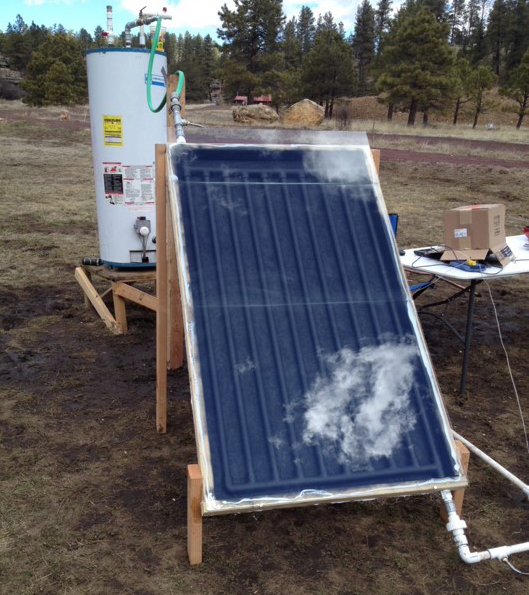
In a flurry of deadline-driven design, analysis, data collection and testing, two teams of engineering and business students from vastly different perspectives converged on a straightforward idea: If you can build this, we can sell it.
What the five mechanical engineering seniors have built is an ultra-low cost water heating system—a product that five MBA students are convinced “could hit the market and work.” They will present their findings as Northern Arizona University’s entry in the P3 National Sustainable Design Expo and competition this weekend in Washington, D.C. The event is being held at the Walter E. Washington Convention Center and hosted by the USA Science and Engineering Festival.
The opportunity arose after a $15,000 People, Prosperity and the Planet grant was awarded last year to Brent Nelson, NAU assistant professor of mechanical engineering. His proposal for a solar water heater became a student project, and now NAU is joining teams from across the country to vie for a grant of up to $90,000 to take their completed design to the world.
One of the engineers, Austin Chott, said he and his capstone team members—Christopher Allen Heine, Thomas Griffin, Matt Beckham and Saleh Alsadiq—spent the fall “designing, analyzing and predicting” before building and testing in early 2014. They had a working model the first week of March.
“It went pretty well, almost exactly as we had predicted during our theoretical analysis,” Chott said. “We’re impressed with the performance in a residential setting.“
Chott said the engineering team used previously designed concepts for the solar collectors, but they were “built from the ground up” using less-expensive parts.
That focus on cost savings proved to be the initial obstacle for Jesse Ocana and his MBA teammates—Shuo Li, Kaila Cacal, Devin Woodruff and Joe Caton—who worked under the guidance of Kathy Savage, professor in the W.A. Franke College of Business, to resolve cost effectiveness with marketability.
“You could see a dichotomy right away between the way the engineers saw it and the way we saw it,” Ocana said. “So we thought, ‘Where do we drive value for the customer while still making an attractive proposition for them?’ ”
While the engineers focused on the physics of heat transfer, the business students turned to target costing, conducted surveys of potential customers and plugged data into various business models.
“The way we went through it is the way you do any startup,” Ocana said. “If you skip any of the steps we went through, you’re going to fail.”
The result is a system targeted for do-it-yourself homeowners who have the time and motivation to save on their water heating costs. The system preheats 50-60 gallons of water so that a home’s gas or electric water heater has far less work to do, potentially resulting in hundreds of dollars in cost savings.
While judges at the competition will draw their own conclusions, the students already know they have come away with valuable experience in their respective fields and some insights about working across disciplines.
As Chott put it, “The biggest challenge was for the two teams to work out a communication system. It was a matter of meeting their needs while meeting ours, so we learned we couldn’t just give them an engineering answer.”



